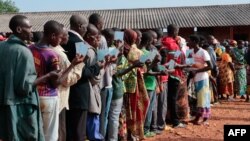Burundi’s opposition leader Agathon Rwasa is claiming an early victory in the country’s first presidential election in five years.
Longtime president Pierre Nkurunziza decided not to run again, giving voters a choice between his hand-picked would-be successor – Secretary-General Evariste Ndayishimiye – Rwasa and five others.
Voters were also choosing a national legislature and local leaders.
Wednesday’s voting was generally trouble-free – compared with the 2015 vote, when election-related violence killed about 1,200 people – although some observers noted that few voters waiting in lines to cast their ballots were heeding calls for social distancing because of the coronavirus.
The National Independent Electoral Commission is telling people to be patient, saying official results will not be ready until at least Monday. Ballots from 3,800 polling places need to be collected, taken to local election headquarters and counted.
But Rwasa told VOA’s Central African service that polling officers from his National Council for Liberty (CNL) party said he is winning.
“The trend is that CNL is leading in presidential, parliamentary and even in communal elections in general,” Rwasa said.
But commission chairman Pierre-Claver Kazihise said “the intermediate figures from polling stations do not show anything. It is the official results declared after the count at the commune level that must be communicated to the people.
Rwasa told VOA that Wednesday was a “great day” for Burundi, but he accused the ruling party of “mischief” and holding the election in an atmosphere of fear and intimidation.
“Police and the security officers were given specific orders which were meant to target mostly people from the opposition,” he said. “Many representatives of our party in the polling stations were arrested and put in custody and were hurriedly sentenced. We also have other many cases where people were expelled from polling offices and even beaten harshly by Imbonerakure (the ruling party’s youth league) and some policemen.”
Although he is making an early claim of victory, Rwasa alleged the elections “were not free, they weren’t fair, and they weren’t that transparent.”
A public security ministry spokesman has accused the CNL of election fraud; there have not been any independent reports of widespread voting irregularities or violence.
The opposition boycotted the 2015 election that turned bloody after President Nkurunziza won a third term.
Burundi is split between the Hutu majority and Tutsi minority. Human rights observers accuse the government of countless abuses, which it denies.





